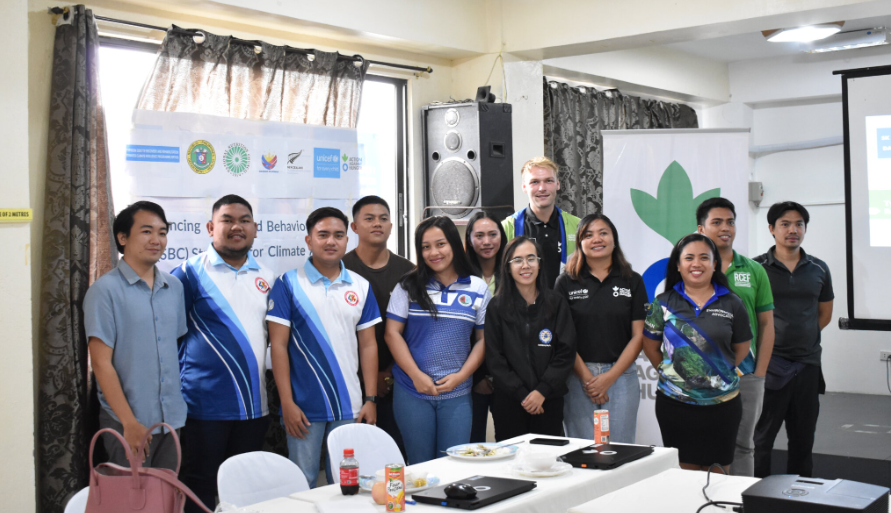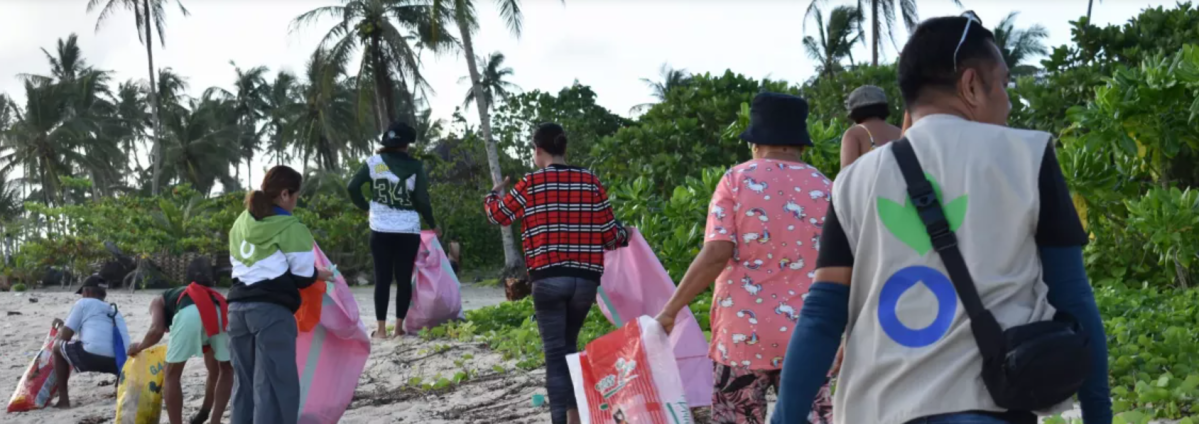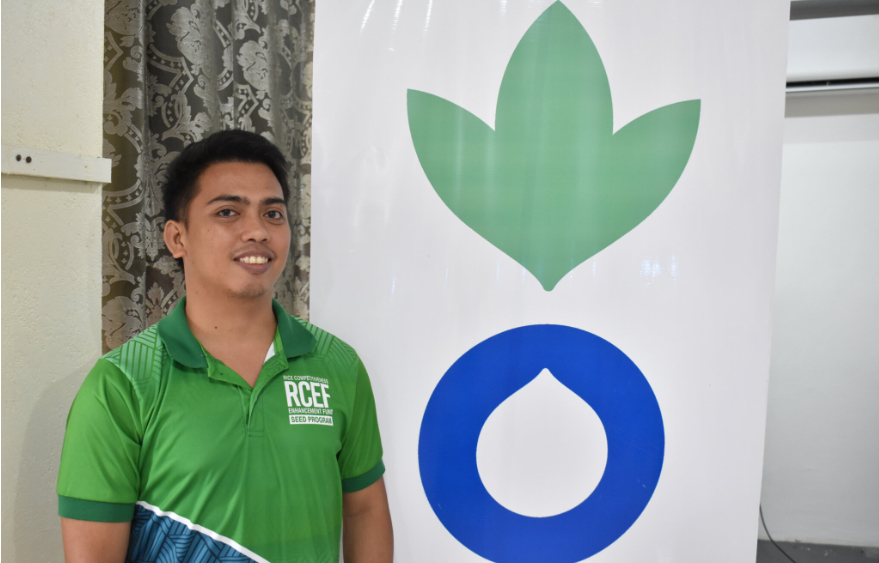

SIARGAO YOUTH TAKING THE LEAD IN CLIMATE ACTION
On March 27, Action Against Hunger Philippines, in partnership with UNICEF, organized a meeting with youth leaders from the Sangguniang Kabataan (SK) and Local Youth Development Office (LYDO) to strengthen Social and Behaviour Change (SBC) strategies for climate action.
Seven youth leaders from the municipalities of Burgos, Del Carmen, Santa Monica, and San Isidro sat down with Action Against Hunger last March 27 to share their ideas, voice the challenges in their communities, and help shape practical solutions for climate action and clean water access. This meaningful discussion marked the start of a series of activities aimed at empowering young leaders in Siargao to take the lead in creating safer, more climate-resilient communities.
This collaboration is one of the initiatives to strengthen climate-resilient Water, Sanitation, and Hygiene (WASH) services in disaster-affected areas, which is part of the Typhoon Odette Recovery and Rehabilitation Towards Climate-Resilient Programme, a partnership between Action Against Hunger Philippines and UNICEF, funded by New Zealand Ministry of Foreign Affairs and Trade. The program is focused on improving local government WASH services, governance mechanisms, and climate adaptation strategies.

The Action Against Hunger team, children, other community members and local representatives joined forces to clean up Barangay Baybay beach in Burgos as a follow-up activity to World Water Day. Photo: Alexane Simon for Action Against Hunger
For one year, the program will focus on improving local government WASH services, strengthening governance systems, and supporting climate adaptation strategies across the municipalities of Burgos, San Benito, Del Carmen, Pilar, and Santa Monica in Siargao — emphasizing both technical upgrades and community empowerment.
Youth leaders at the center of change
Our meeting with the youth leaders marks the beginning of deeper conversations and lasting collaboration with youth representatives in Siargao. Our goal is clear: to ensure young leaders — especially from the Sangguniang Kabataan and the Local Youth Development Office — are not just included but actively engaged in our efforts. As key advocates for their peers, they play a vital role in raising awareness on clean water, sanitation, and climate change. By equipping them with practical tools and knowledge, we’re helping empower the next generation to lead meaningful, sustainable change in their communities.
Through this collaboration, we also aim to support youth leaders by helping them develop the skills and knowledge they need to guide positive and lasting changes in their communities, especially as part of local decision-making and leadership. Their unique perspective and strong connection to their communities make them essential in promoting lasting behavior change and ensuring that the voices of young people are heard and reflected in local development efforts.

In photo: Louie Ville Oro, the Municipal Agriculturist in Santa Monica and LYDO Designate of Santa Monica in-charge to perform and supervise all youth programs
“Young people are crucial in influencing local government policies and implementing sustainable solutions for climate resilience and WASH improvements,” said Louie Ville Oro, the Municipal Agriculturist of Santa Monica and LYDO representative. “I’m positive that through this session, we can harmonize our outcomes at the LYDO level and integrate them into the Local Youth Development Plan. That way, whenever there are financial opportunities or budget alignments, the municipality can support.”
The initial meeting served as a vital space to align youth leaders on shared strategies and directions for climate action, while also laying the groundwork for deeper collaboration. Importantly, this is only the beginning. This is the first session of planned engagements with this youth leader. Future sessions will support them in developing clear and actionable social and behavior change strategies tailored to the context of their community, ensuring their ideas and initiatives are translated into concrete actions and integrated into local development planning.
During the discussion, Louie emphasized how young leaders can lead locally grounded solutions, even with minimal resources. “The facilitator gave us a toolkit from UNICEF — that is the one I was looking for, and I’m excited to go deeper. Because that toolkit will be the guide for the SK to roll it out at the barangay level: to identify the problem, to analyze a possible solution that can be feasible at the SK level considering the minimal budget.”
Through dynamic focus group discussions, participants carried out a rapid behavior assessment, providing valuable insights into the challenges their communities face around WASH and climate resilience. Working together in a spirit of openness and mutual learning, the youth leaders thoughtfully analyzed key local issues. This process helped them identify specific behavioral changes needed in their communities and propose concrete solutions to address them.
This initiative underlines the crucial role youth play in shaping their future, especially in the face of a climate crisis that disproportionately affects the Philippines. Between 2016 and 2021, nearly nine million Filipino youth were impacted by climate change-related disasters, according to UNICEF.
And it’s more than true in Siargao where the environmental pressure is growing. Not just from natural factors but also from tourism, waste management challenges, and fragile ecosystems.
The island also experiences limited freshwater supply, with local springs drying up during summer and groundwater sources experiencing saltwater intrusion. These issues disproportionately affect disadvantaged and remote communities, leaving them without potable water for drinking and domestic use.
“I’m expecting that we will go deeper as we move forward…It’s an eye opener because it’s a new challenge but we’re going to be involved more, especially since we live in an island community and taking climate action is very important,” said Louie.
These young leaders in Siargao are determined now more than ever to dedicate time and energy in helping shape how their communities approach water, sanitation, and hygiene — especially in the face of disasters and a changing climate. Their fresh perspectives and creative ideas open up new ways of tackling long-standing challenges, often bringing to light practical solutions that may not have been considered before.
Additionally, youth leaders are digitally savvy and can leverage technology for awareness campaigns, data collection, and communication about WASH, DRR, and Climate Change Adaptation (CCA). Their ability to harness technology and digital communication tools allows them to run effective awareness campaigns, collect data, and engage peers in positive WASH behaviors and DRR practices.
“I think that [a strong familiarity with technology and digital tools] is one of the best assets of today’s youth. Considering the technology available, it is possible that the SK can elevate strategies and drive changes,” said Louie. However, he also points out that not all communities can rely on digital tools alone, so a combination of traditional and modern channels must be explored and there’s a growing need for adaptive communication strategies. “Maybe we can utilize another platform of communication. Some barangays in Siargao have public audio systems : they can broadcast. Those are early warning systems or even for barangay assemblies.”
A new generation driving local solutions for the future
Action Against Hunger and UNICEF are fostering a new generation of climate advocates who will drive sustainable change in their communities by equipping youth leaders with the knowledge, skills, and tools they need. This initiative affirms the influence and capability of youth-led solutions to tackle the pressing environmental challenges affecting vulnerable populations across the Philippines, especially in Siargao.
